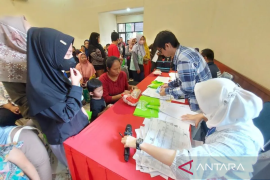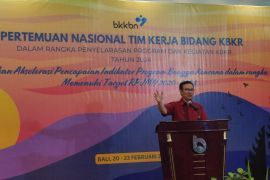"The key is preventing new birth of stunted babies. We emphasize that regulating birth spacing is important, accompanied by successful breastfeeding. We know that gap between pregnancies is highly related to stunting," he noted in a statement received here, Friday.
Wardoyo made the remarks at an online seminar on Good Practices for Stunting-Free Villages in the First 1,000 Days of Life (HPK) with the Association of Police Officers' Wives (Bhayangkari) and several village heads from various provinces.
In addition, a representative from the Social Department of Bhayangkari, Elizabeth Argo, affirmed that her side always supports the government's policy by helping to accelerate stunting reduction through Kemala Posyandu activities and has been able to foster around 574 integrated health posts (posyandu).
"In every work visit, Bhayangkari always distributes additional nutritious food assistance for children with stunting and provides education to parents, who have toddlers, as well as pregnant women about knowledge and prevention of stunting in children," she stated.
At this seminar, Head of Mentuda Village, Lingga District, Riau; Head of Maibo Village, Sorong District, West Papua; and Head of Purwajaya Village, Kutai Kartanegara District, East Kalimantan, drew attention to the innovations in their respective villages or sub-districts regarding good practices to handle stunting cases.
Related news: Foster father program helps overcome stunting, extreme poverty: BKKBN
In Mentuda Village, innovation is being carried out in the form of posyandu officers' visits to residents by distributing vitamins and blood-added tablets, conducting a cooking demonstration to fulfill the nutritional requirements of pregnant women, and starting a Community Food Barn.
Moreover, in Sorong District, innovation being conducted is in the form of a healthy kitchen program by providing balanced nutritious food to toddlers with stunting through catfish cultivation and cattle farming as food security activities and meeting protein requirements for families at risk of stunting.
Meanwhile, in Purwajaya Village, innovation is being carried out through an inspirational class involving parents at the HI Gaharu Early Childhood Education (PAUD) school as a lab site for parenting that provided outreach to prevent stunting as well as mutual cooperation to make tarpaulin pools and chicken cages for children with families at risk of stunting.
As a result of the innovations been conducted in these three villages, based on Electronic Community-Based Nutrition Recording and Reporting (EPPGBM), the stunting prevalence rates in those areas had decreased significantly.
In Mentuda Village, the stunting prevalence rate decreased, from 9.35 percent in 2022 to 7.39 percent in 2023, while in Purwajaya Village, the stunting prevalence rate also plummeted, from 7.02 percent in 2022 to 2.43 percent in 2023, and in Maibo Village, the stunting prevalence in 2023 was recorded at 11.1 percent.
Related news: National Children's Day and the challenge to overcome stunting
Related news: Jokowi says government to ensure stunting reduction in all regions
Translator: Lintang Budiyanti P, Resinta S
Editor: Yuni Arisandy Sinaga
Copyright © ANTARA 2023












